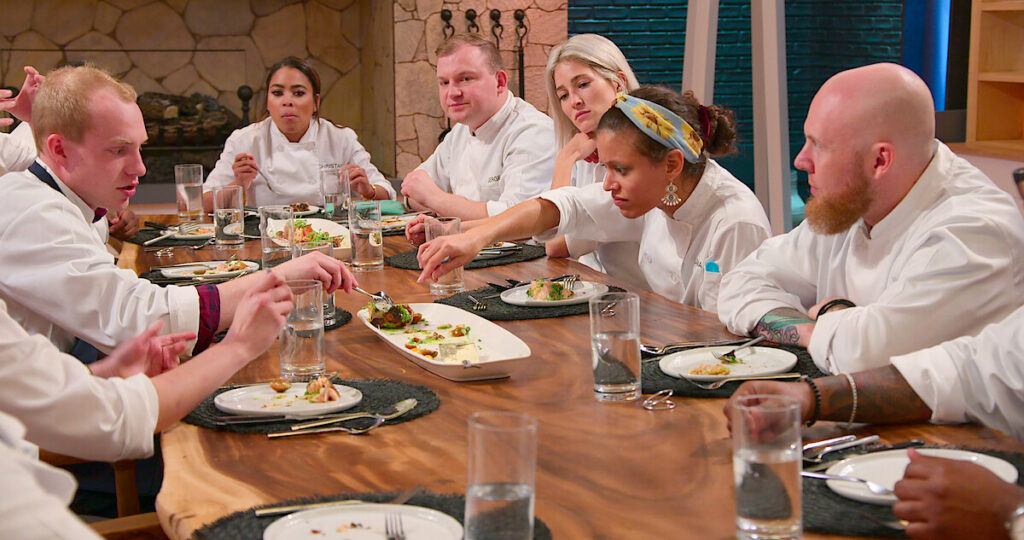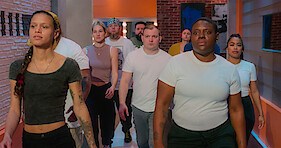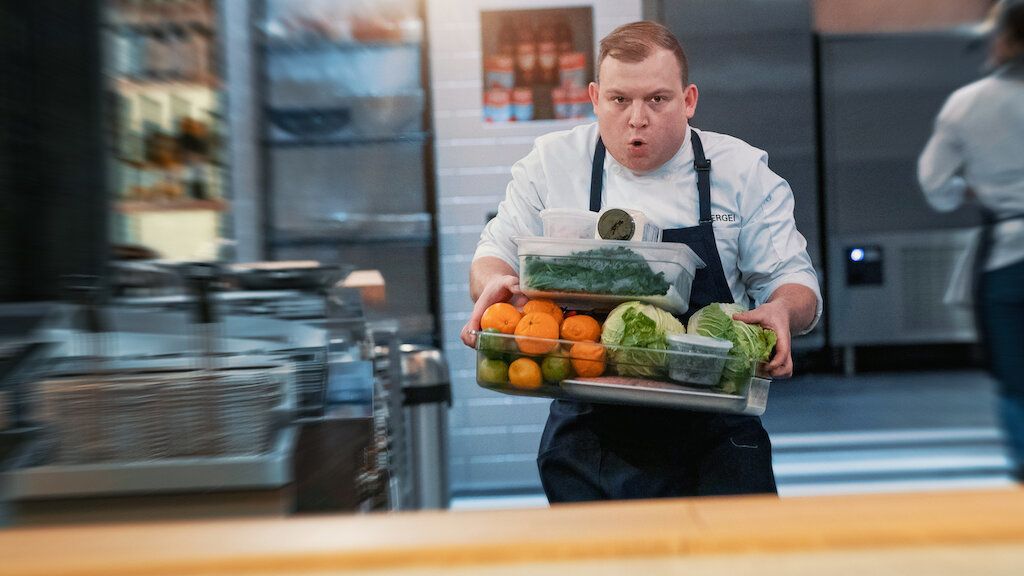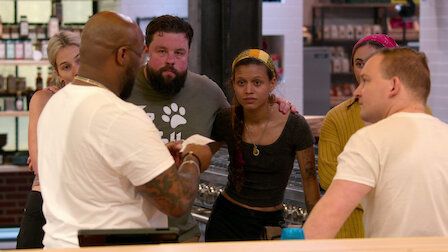‘Pressure Cooker:’ A Look at Marginalization in the Industry
LEGEND OF VOX MACHINA Season 2 Ep. 4-6 Breakdown & Easter Eggs (Nerdist News w/ Kyle Anderson)
January 28, 2023The DEAD SPACE Remake Secret Ending Fills in Some Franchise Blanks
January 29, 2023‘Pressure Cooker:’ A Look at Marginalization in the Industry
https://blacknerdproblems.com/pressure-cooker-a-look-at-marginalization-in-the-industry/
The Journey to Bread and Butter
When Netflix advertised Pressure Cooker to me, I thought they were just goading my reality cooking competition interests out. “Sure, I’ll give in to a little hot sauce on my Friday afternoon,” I ignorantly thought to myself. I assumed this will be a culinary competition like usual. I occasionally disagree with the judges, I hear a bit of drama from competitors, I get some inspiration for my own dishes, and call it a day. Pressure Cooker showed me the world behind the reality cooking competition I thought always existed but was edited out for family friendly viewers.
I’ve been telling every Black person I know to watch Pressure Cooker whether they are into reality competition cooking shows or not. The kitchen, where taste buds and technique reign supreme, falls into anti-Blackness and complicity as if by magic. Pressure Cooker is a brilliant format for a reality cooking show because it showcases the industry’s problem by taking out the middle man. It lets the environment create itself. It shapes the barricades and within minutes marginalization peaks its head. What could be resolved in more diverse casting, becomes a clear lesson of what we experience regularly.
Pressure Rising
I started Pressure Cooker with my partner one Saturday evening over dinner, expecting the regular. We root for everybody Black, and I judge people’s culinary decisions under pressure. The first competition required the contestants to make a dish for everyone within 90 minutes. Since every competitor is also a judge, everything from what type of dish you make, to the comments you make on other people’s dishes is part of the game. The balance between a social and craft is essential. Competitors rate the dish from most to least liked. The producers tally the results to choose the bottom scorers. From there your peers vote on who gets to stay.
I immediately froze. Everything I know about moving through corporate and the entertainment industry came flooding to me. You mean to tell me y’all just made a game about navigating whiteness but made it a cooking competition too? We already have navigating whiteness while stranded on an island: it’s called Survivor. Four people of color in a predominantly white peer group where your peers decide whether you are worthy of getting $100,000? I stared at the screen and told my partner “there will be a split in the house.”
No matter how much I wanted it to be, this will not be based in skill alone. I wanted to believe that every person of color would be safe as long as they performed their best. I knew I would be wrong, I prayed anyway.
The Heating Element
I immediately took a liking to Chef Renee Blackman. Blackman is an Afro-Caribbean chef who became a top contender in Pressure Cooker the moment she won the first competition of the season. Renee Blackman, Lana Lagomarsini, and Ed Porter were the top three and safe from elimination. I can live with that, I thought.
But the first red flag started waving during the first team challenge. The house was split in two. The goal was to create a cohesive menu highlighting different flavor profiles (sweet, salty, umami, sour, and bitter). Since Renee and Lana were the top two in the last challenge, they became the team leaders. While the teams were cooking, I noticed Sergei disrespecting Renee’s leadership. He was straddling the fine line between peer critique and advising. From trying to tell Renee about when she adds her ingredients to advising Christan’s plating a team effort transformed into taking charge. When there is a designated team leader, trying to chalk up “taking the lead” because of their personality doesn’t help the goal.
This often happens to people of color, particularly Black women in various industries. Black women, are not often placed in positions of power, and when they are, it’s subliminally stripped away from white people who’ve been privileged enough to see themselves as leaders. They would become bossy or give “passive aggressive” suggestions that go against the leader’s goal.
Roughly 16% of all head chefs are Black. The subtlety of mistrust, the belief that you know better, and acting upon that upholds marginalization in the same way institutions have for generations.
The Sauce is Simmering
Renee (Captain of the Yellow Team) nominated Christan and Brian for elimination. Christan, made a bitter green salad, where the critique from the judge was that it didn’t have enough bitter notes. Brian made a panna cotta. Though his flavors were applauded by Liv, it faulted in technicality because it did not set. Throughout the challenge Brian reassured that everything was handled. This was not the first time Brian’s dish faulted on technicality. Brian is a big risk taker, but those risks on both occasions fell through.
The second red flag hit immediately. Who do you allow to stay? The argument for bigger risk harder fall, or low risk, faulty follow through. I want to believe that consistency is rewarded. What broke my heart is that I knew Christan was leaving before the plotting began. Who becomes easier to discard? I tried to chalk it up to a game move. You take out the potentially bigger target in hopes of bettering your odds. But as the game went on, it became interesting to see who was always in danger.
Who was targeted in the confessional? By the time Jeana made her rounds with Christan, I already knew who would be next. Christan, Ed, Lana. People of color are given less chances for redemption when they fail but are not highly regarded when they succeed. Everyone was telling Christan she was okay, but Jeana was rallying in secret to get her eliminated. Why was this able to happen more than once?
When Lana was on a team with Jeana, Caroline, and Sergei who did they think was worth saving?
Release the Pressure
Lack of consistency should have had Jeana on the block multiple times. Bottom three in the first challenge, negative remarks on the second. Lana placed on the top consistently but when the moment came where she can be discarded, it happened. People of color experience this often in the industry where a moment of vulnerability gets them eliminated. Sometimes the most interesting thing about complicity is that it’s easier to mask. Sometimes complicity looks like watching something happen and the justifications are magically lined up. Manipulation in a way that almost looks reasonable. It looks like betrayal with perfect excuse.
I wanted to believe that every person of color in Pressure Cooker would be safe as long as they were consistent. But how can you show off consistency when your colleagues already set it out that they need to get rid of you. It’s a similar feeling across industries, where you’re remarkable but feel expendable. Understanding who is able to succeed in spite of. In Pressure Cooker, your peers decide who gets an upper hand. Your peers decide who fail. When you lack representation among your peers, it’s easier to be seen as forgotten, or a tool for someone else’s rise.
The Power of Community
When it was time for Ed and Brian’s face-off for elimination, I believe the anonymity of the dishes played a part in Ed’s survival. Both dishes, looked remarkable. Ed was going through some issues in his preparation and forgot something for his dish entirely. Confessional proved to be skewed to keep Brian for manipulative reasons. Jeana assumed that the more rustic dish was Ed’s and turned still when Brian was the one eliminated.
Everything can be led up to devious planning. At the same time, these are the same movements people have utilized in corporate settings and everyday occurrences. A gaslight, wondering if you’re the crazy one. Thinking you’re safe by teaming up with them, sharing a common goal. But a common goal is not the requirement. A common goal becomes the excuse when people of color cannot live up to a standard. It is why we’re not often offered the ability to be in power. It eliminates the need.
The house split had layers of deceit. Obvious game play, but another thing that reigned clear throughout the series. Pressure Cooker, though a brilliant format for a reality cooking show only revealed what people of color have to deal with on a daily basis. Fighting to be respected in an industry whose peers appreciate the flavors of the offering, but not the chefs themselves. If there is anything that reality competition shows reveal, is that some things are not overt. It’s hidden, yet persevering in all forms. It divides and creates discomfort in a way that might make you feel gas-lit for pointing it out, but it makes itself known in all corners.
Want to get Black Nerd Problems updates sent directly to you? Sign up here! Follow us on Twitter, Facebook, Youtube, and Instagram!
The post ‘Pressure Cooker:’ A Look at Marginalization in the Industry appeared first on Black Nerd Problems.




